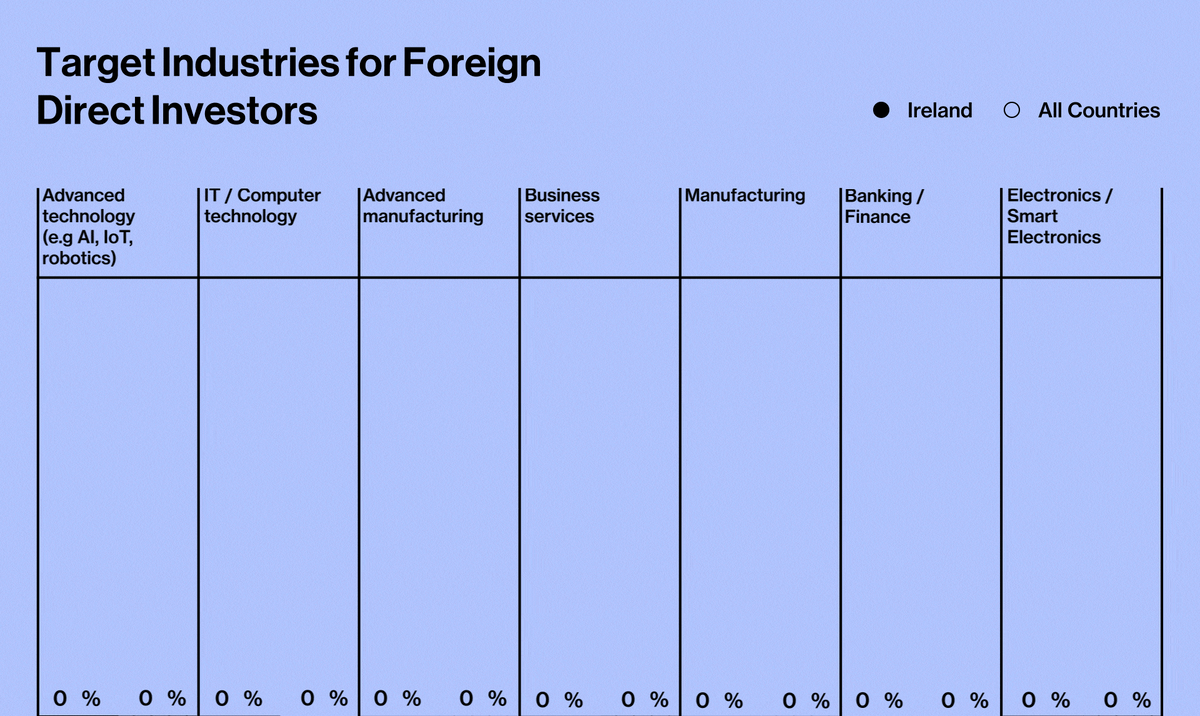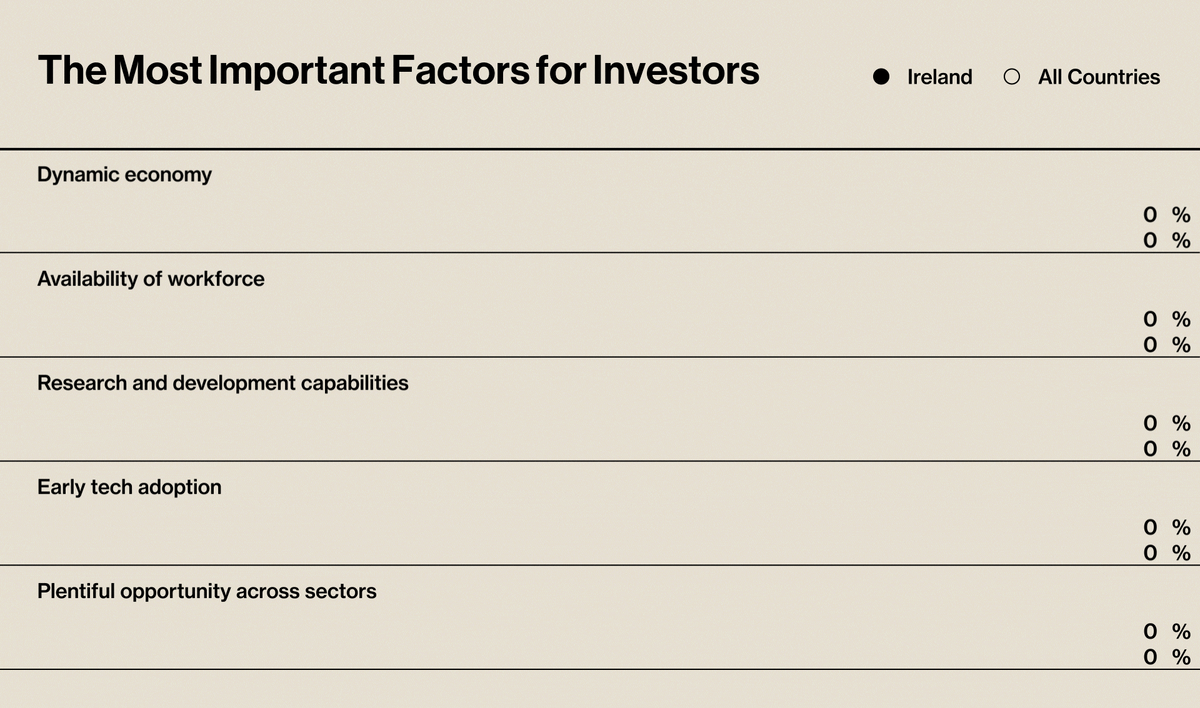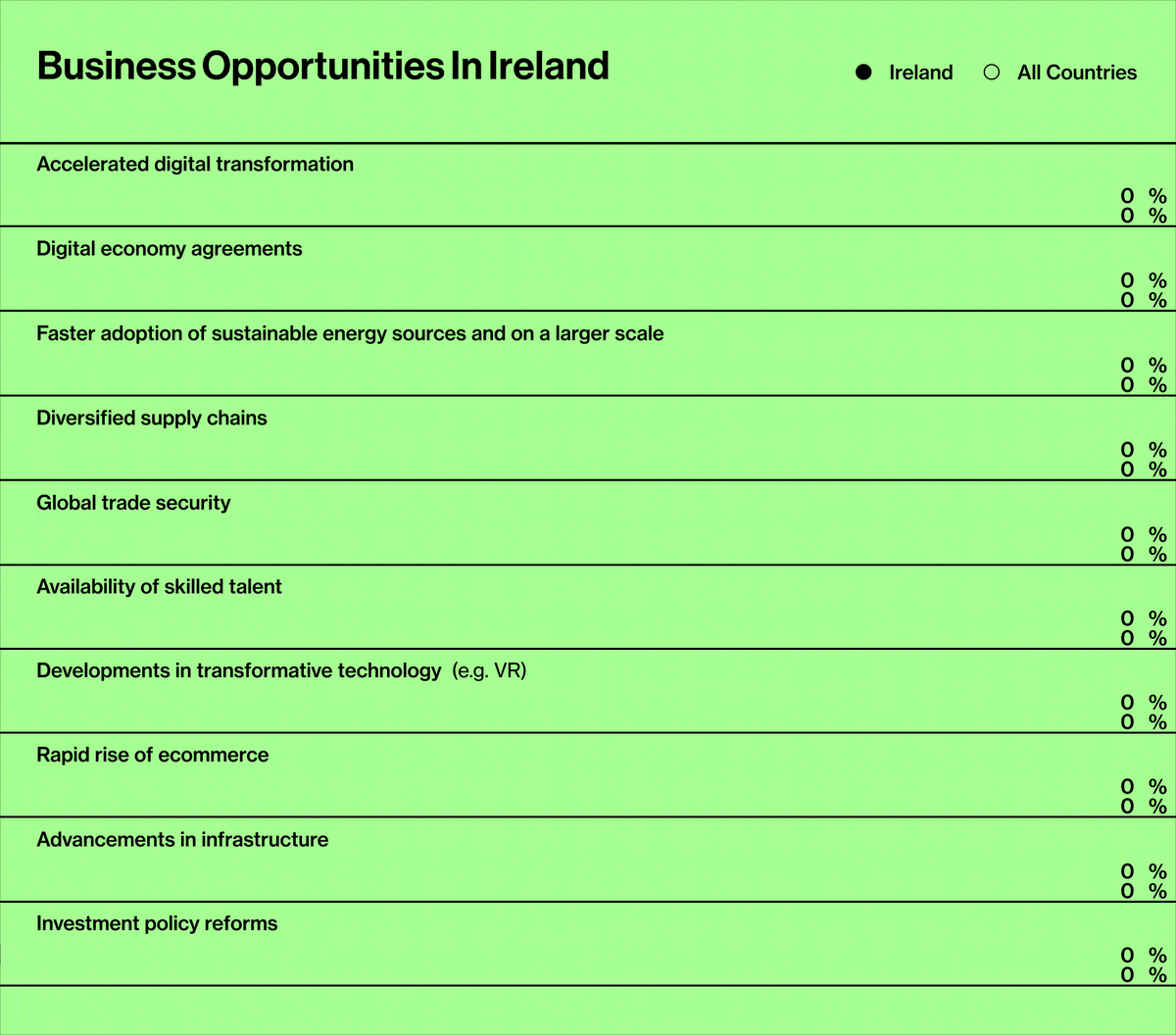
Tech Innovation Drives Ireland’s Robust Growth
The world’s leading technology companies have made Ireland a global center of innovation, and the country’s ability to attract investment continues to grow its specialized tech clusters.
When California-based medtech company Dexcom announced in May that it will build a state-of-the-art facility in the Irish town of Athenry, County Galway, it signaled recognition of the country’s leading role at the intersection of technology and health care.
Dexcom is the world leader in real-time continuous glucose monitoring for people with diabetes, and its $327 million investment in Athenry adds to the growing international status of Galway’s remarkable cluster of around 20 medtech companies that comprise a hub of health care expertise on Ireland’s west coast.
The facility’s creation of up to 1,000 high-tech jobs will leverage the abundance of technologists in Ireland’s young workforce. “Ireland has an exceptional talent pool and an established medtech sector, making Athenry the perfect location for us,” says Barry Regan, Dexcom’s Executive Vice President of Global Operations.
Bloomberg’s 2023 global study of FDI investors found that 51% of those planning to invest in Ireland within the next one to three years are motivated by Ireland’s expertise in advanced technologies, such as artificial intelligence and robotics, compared to 36% of FDI investors globally.
This high level of FDI interest is a direct consequence of the Irish government’s long-term commitment to placing technology at the heart of its economic strategy, which helped Ireland’s GDP grow by 12% in 2022.
“Critically, successive Irish governments have underlined their commitment to and partnership with enterprise,” says Michael Lohan, CEO of IDA Ireland, the country's investment promotion agency. “This allows companies to fully embrace key opportunities, such as those sectors associated with the green and digital transitions.”

Big tech has taken note, and Ireland is home to 16 of the top 20 global technology companies; most have been operating in the country for over a decade. Embracing technology as a whole, Ireland has succeeded in creating various innovation clusters in specialized tech sectors. Dexcom is part of the Irish medtech ecosystem that includes 14 of the world’s 15 leading medtech companies.
Ireland also hosts the 10 leading global biopharma companies, with notable clusters in Dublin and County Cork. American pharma giant Eli Lilly arrived in Ireland in 1978, and employs 2,700 people on its Cork campus.
“Ireland has a proven track record as a stable location in which companies can implement ambitious and innovative investment projects.”
— Michael Lohan, CEO, IDA Ireland
In a major new investment in Ireland, Eli Lilly is spending close to $1 billion to create a facility with the “latest biologics manufacturing technology,” including advanced data collection and analysis systems. The 500,000-square-foot facility, which is expected to create 300 highly skilled jobs, is being built at IDA Ireland’s business park in Limerick, in the Mid-West Region, located between the biopharma and medtech clusters of Cork and Galway.
This investment underscores the strategic importance of Ireland to the global operations of Eli Lilly—one of numerous multinationals with a base in Ireland.
Kieran Donoghue, Global Head of Strategy, Public Policy and International Financial Services at IDA Ireland, says the country is a tried-and-tested FDI destination. “You’re looking at a small country like Ireland, and you see 1,800 multinational companies there, including a lot of your peers and competitors. That does give you comfort that the decision to invest in Ireland is the right one.”

Global companies are attracted by Ireland’s young, diverse workforce and easy access to the European market. In response to Bloomberg’s latest FDI study, investors considering Ireland identified the potential for “expanding into new territories” as a primary attraction (59% of investors, compared to 50% for global investors). They also confirmed their interest in Ireland’s “business support services” (55%, compared to 39% of global investors) and the “development of local supply chains” (52%, compared to 39% globally).
Donoghue says Ireland has developed a management class with the skills to efficiently manage operations that extend across Europe and the world. He points out that the country enjoys the “demographic dividend” of a young population, which provides a pipeline of graduates and helps companies plan ahead. “You can hire people to build careers in your company over the long term,” he says.
Ireland has “one of the highest levels of STEM [science, technology, engineering, math] graduates per capita in the EU,” and is seen by foreign talent as an “attractive destination for people to live and work,” says Donoghue. “About 20% of our workforce are non-nationals,” he notes.
Dublin hosts so many global tech companies—including Google, Meta, Amazon and Airbnb—that the cluster area is known as “Silicon Docks.” LinkedIn, which employs 2,000 people in Ireland, is building a European headquarters campus at the district's Wilton Park complex.
Many FDI investors are drawn to Ireland’s strengths in IT and computer technology, which are a magnet for 48% of those looking to invest in Ireland over the next one to three years, compared to 28% of global investors, Bloomberg’s FDI study found.
Many of Ireland’s specialist tech clusters are working together and sharing expertise.
Ericsson’s Irish research and development center is in the center of the country, at Athlone, where it supports the company’s cloud-native products that power its 5G portfolio. The center employs 1,200 people and recently announced plans to hire 250 more staff in highly skilled roles including software development, data science and cloud engineering. “We are excited to continue attracting and nurturing the best and brightest Irish and international talent to the heart of Ireland,” says Denis Dullea, Head of Network Management Engineering and R&D at Ericsson’s Athlone site.

Engineering, business services and financial services are also boosting Ireland’s FDI. Across all metrics of Bloomberg’s FDI study, Ireland outperformed the market as an attractive destination. Investors cited the potential for “long-term investment in infrastructure” (47%), “building new commercial facilities” (43%) and “manufacturing” (42%), among their major considerations.
What is Ireland’s secret recipe for innovation and FDI? “We have a highly skilled and talented workforce and can offer a platform to expand into the European market and further afield,” explains Lohan. In addition to the talented workforce, excellent location and the extensive practical and financial support that IDA Ireland offers its investor clients, Donoghue also points to two things. One is the worldwide Irish diaspora, which encourages Ireland’s population to be open to the world: “There’s an international globalist perspective almost embedded in people,” he says. The second is Ireland’s “very strong oral culture,” which lends itself to a skill set in communications technology.
Increasingly, multinationals and FDI investors want to be part of Ireland’s conversation.
